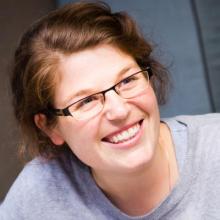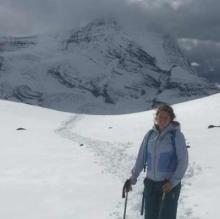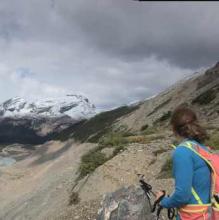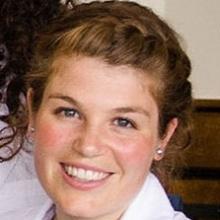Lauren Irving
What are your main responsibilities or activities in your current position?
I am employed by Northern Health as a Family Nurse Practitioner, and I work for Central Interior Native Health Society (CINHS), a non-profit primary health care clinic located in Prince George. This interdisciplinary health care clinic offers primary care to Indigenous people, those living close to or on the street, and those living with HIV or addictions. Here there is a huge demand for clinical time and the majority of my days are spent working with patients of all ages, providing them with primary health care services. I am particularly interested in our pediatric population and pay special attention to these patients by running both a pediatric clinic at CINHS and an outreach clinic at a local school once weekly. The pediatric clinic at CINHS focuses on children ages 0-6 and includes a RN, an elder, an Indigenous support worker, a dental hygienist, and myself.
It is of utmost importance that families feel they are not under surveillance while attending our clinic. The location for the outreach clinic was chosen after we realized that our pediatric patients were not being seen for primary care at CINHS despite our best efforts to make a family friendly space. Here I work with the school staff to address various medical concerns which present themselves while in school or which have been undiagnosed for years. Most of the children who attend the school are either already patients of CINHS or not connected to primary health care. If found to be unattached to primary care, these children are offered attachment through CINHS. Since starting this clinic in January 2015, we have seen huge successes in attaching pediatric patients to primary health care and ensuring that timely and appropriate diagnosis and treatments are being received.
How does your current work relate to your graduate degree?
While studying at UBC I became aware of the social pediatrics movement thanks to exposure to the RICHER Initiative, which has produced valuable research that illustrates how providing primary health care through a social pediatric lens can positively impact early childhood outcomes. Upon returning to Prince George and realizing the dire health care needs of my pediatric patients, my connection with the RICHER Initiative influenced my decision to begin providing primary care through a social pediatrics lens. In my work today, I am trying to replicate the successful model of RICHER and bring primary care to vulnerable children and youth. UBC and the RICHER Initiative have embraced my attempts to duplicate their work in Prince George and have continued to support me in my efforts. I hope that in duplicating their strategies, I too can make such a positive impact in the lives of my pediatric patients.
While attending UBC, I was also introduced to the UBC Human Early Learning Project. Today, I frequently look to their research and use it to guide my work. I love reading their publications and am particularly moved by the work of the late Clyde Hertzman.
What do you like and what do you find challenging about your current position?
I love the challenge of my job. My brain is continually working overtime trying to determine the correct diagnosis for a patient’s complaint. My patients are extremely complex, so I am never bored. The patients at CINHS are an extremely marginalized and vulnerable population. In 2015, the average age of death for patients was age 51. Working with such vulnerable and marginalized patients is rewarding; however, it is also extremely challenging. The pediatric population can be particularly trying. Many of the children we see live in poverty with unstable housing and limited family support. Although this can be difficult to witness, it also reminds me of how lucky I am and allows me to be grateful and feel fortunate for everything that I have in my life.
In my role, I frequently teach nurse practitioner students, medical students, or medical residents. This helps keep me up to date in the latest research and also keeps me on my toes. I love practicing evidenced based medicine and learning about new research that impacts diagnostic and treatment decisions.
Is your current career path as you originally intended?
I have always been fascinated by the Indigenous culture in BC. I feel privileged to be working with this population in my home town.
What motivated you to pursue graduate work at UBC?
Both of my parents are UBC alumni, and I grew up hearing about their exploits around campus. These warm memories influenced my decision to attend UBC and experience the campus for myself. Of course, UBC has a gorgeous campus and a reputation for excellence.
Moreover, when researching graduate programs offering the Family Nurse Practitioner degree, the UBC program was the best fit for me, as it was delivered on campus over a two-year period and boasted an all-star faculty. The UBC MN-NP is a competitive and rigorous program that is known to prepare you for the workplace and has a reputation for producing successful graduates.
What did you enjoy the most about your time as a graduate student at UBC?
Studying at UBC was an amazing experience. It was a privilege to study among nursing professors who hold rock star status in our professional world. They inspire me and remind me not to set limits on myself or my work. Because of the small cohort in the MN-NP program, my classmates are some of my best friends today and are always available to support me whether professionally or personally. The UBC campus is beautiful and I enjoyed exploring the university grounds; I also enjoyed participating in the different intramural activities offered where I met students from different programs and expanded my friend group.
What key things did you do, or what attitudes or approaches did you have, that contributed to your success?
When I entered the program, I was the youngest in my cohort. I knew that I had to work hard to prove myself, so I took myself and my courses seriously. Although my goal in school was not to be top of the class, I knew I had to perform above average. I also made sure that I was keeping a well-balanced lifestyle and spent my free time participating in intramural sports, working as a Registered Nurse when my schedule allowed it, and socializing with my friends and classmates. I took opportunities to gain an array of experiences in my clinical sites, and I am thankful for this now. Every chance you can get as a student to glean knowledge from a preceptor or professor will benefit you once you are out practicing on your own. For my final practicum, I chose to spend time in a rural community in the East Kootneys. I encourage all students to take opportunities to work with Nurse Practitioners or Physicians in rural practicum sites as the experience is priceless.
What is your best piece of advice for current graduate students preparing for their future careers?
The Nurse Practitioner community is still quite small – remember this and never miss an opportunity to make connections. Take every opportunity you can to work with others. Be outgoing, and jump at chances to spend your clinical hours in different practicum sites. If the chance presents itself, take opportunities to gain extra clinical hours. This is a great way to network and provides you with invaluable experiences. Work hard on your coursework – the more you can soak up from your courses, the better prepared you will be to pass your licensing exams and gain entry into your profession.
Once you begin practicing, you will be thankful for your vast network of support. Dress for success; even if you feel as though you are an imposter and know nothing, at least you will look the part. Today I still do this – whenever I have a presentation to deliver or an intimidating meeting to attend, I always make sure that I have a great outfit on.
It is important that no matter what you end up doing with your career, at the end of the day you feel as though you are helping people and having a positive impact on your patients and your community.
Did you have any breaks in your education?
The UBC MN-NP is a rigorous two-year program with only limited time off in the summer. To me, this was part of the appeal. Due to the complexity of the content, I felt it was important to remain continuously engaged throughout the year – so I did not take any unscheduled time off during the program. With what little time off I had, I spent it either indulging in short vacations or working casually as a Registered Nurse.
How did you find out about/obtain your current position?
My position was posted on the Northern Health website. All nurse practitioner positions within Northern Health are posted online: http://expectmore.northernhealth.ca/. I applied for my position prior to graduation and accepted the position with a start date of two days after my final licensing exam.
How are jobs normally posted and filled in your organization or industry?
Currently there are 10 positions posted with Northern Health. We have some exciting recruitment incentives to help lure potential candidates to the North.



